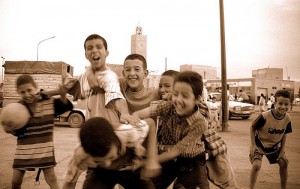Ain’t Ain’t A Word
02/18/09
I guess you could say I’m proud of my blue collar/working class background. Of course, when I was a youth I often felt wretchedly disadvantaged, especially at that age when it becomes important to wear certain brand jeans and sneakers to be considered a worthwhile human being or a worthy suitor to the neighborhood’s prettiest girls.
But now that I’m a relatively mature adult, I am deeply grateful not only for the efforts made by my parents to support us but also for the lessons that my working class environment thought me.
Of course, this website is only partially about self-congratulating for how remarkable I am. My point here is that because of my background, I grew up speaking a certain brand of Spanish specific to my region and to my social environment. And I love it. I love it so much and it’s so much a part of me that I speak in that way to my son some times. To put it in perspective, imagine using an English sentence with your child along the lines of: “Ain’t no dang dog gonna bite you”.
So by now, you see my dilemma — Do I try to steer away from this form of Spanish so that my child learns instead a “proper”, “standard” (and perhaps more sterile) form and is therefore better able to communicate in Spanish with people from all regions of all Spanish-speaking countries? Or do I stay true to who I am and trust that what I’m teaching him is not so drastically slangy that it won’t be a detriment to his ability to communicate?
I have to admit this question comes as much from actual curiosity about the best thing for my child as it does from my own desire to reaffirm my “Colombianness” after years of not living in my native land. But I’m again letting my personal insecurities permeate this blog so I’ll save those for my upcoming “Poor Me” blog. Though it is worth admitting that part of why I proposed this topic of slang and regional variations of the tongue is because I want my children to fully embrace all aspects of their background (Colombian and American) and I feel like a part of that is learning to speak and understand the colloquial version of the language that they will inevitably hear from my family back home and from many of my friends here. So maybe as I write this I’m answering my own question–It seems like love, communication, and open discussion about what it means to be Colombian and what it means to be American (and what it means to be Colombian-American) is the best education I can give them and the rest can be figured out along the way and is not that big a deal.



First, I must say you are a fabulous writer Ruben. Seriously, you should look at formally publishing your work.
As for the language issues.. I have some thoughts on this. Having worked in immersion schools I have experienced the dialect debate on many occasions. When you have a school full of teachers from different countries all teaching Spanish Immersion, there is much variation on how content should be presented. You wouldn’t believe the debates that erupted over the translations of simple classroom newsletters!
One thing I have learned is that kids are able to absorb complexities of language much more than we give them credit for. Kids can learn multiple dialects and even learn to use speak quite differently across settings. My own daughter, a Colombian/ American has already expanded her own developing Spanish so much by having close friends and teachers from different Spanish-speaking cultures.
My recommendation – be yourself with your boys! AND take time to explore the formal register with your kids and model for them how you code switch across different settings. They will learn so easily you won’t even believe it.
Just a few thoughts from a language teacher..
My mother spoke only “High-German” with us, so I have no dialect issue when speaking with my bilingual boys. I can only assume that, when I would speak a German dialect instead, I would speak with my boys as my beak has grown, as we say in German. After all, in a bigger picture, the different languages are like dialects and we parents who want our children to learn our mother tongue want them, in a way, already to speak a dialect, namely our dialect.